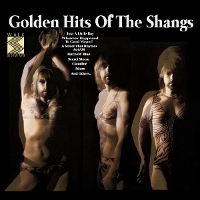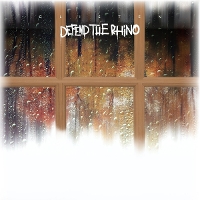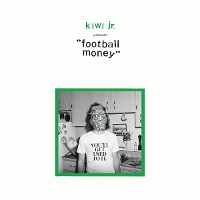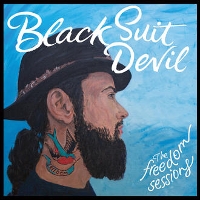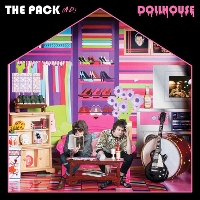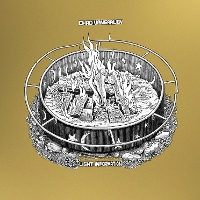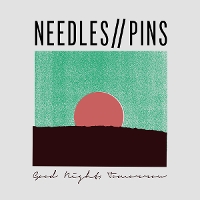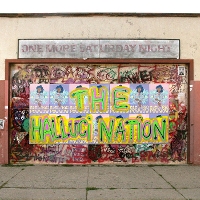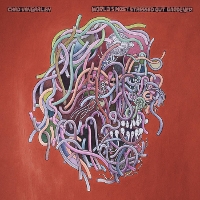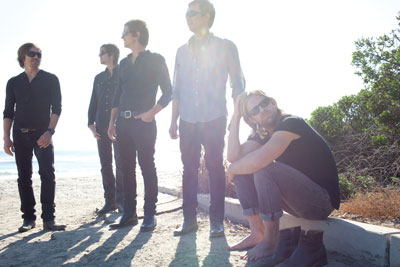
Switchfoot: Hearts on Their Sleeves
Tim Foreman Discusses Charting New Territory and The Questions We All Have
I trudge up the stairs toward the fabulous Commodore Ballroom. I am more troubled than usual—which is saying something. Switchfoot is a band with two really great modern rock songs “Dare You To Move” and “Mess Of You.” But here’s the problem: The band is a Christian band. Normally, this information would cause me to completely ignore this band. But they have those aforementioned two great songs that are my guilty (now even guiltier?) pleasure. So I had to suck it up and take this interview as an opportunity to grow as an interviewer.
Scott Wood: As research for this interview, I was watching the video for your song “Awakening” and it has a whole bunch of regular “dudes” rocking out to Switchfoot in secret. So being a rock star is the fantasy of all those “dudes.” You are a rock star, so what secret fantasy are you mostly likely to be busted doing?
 Why the record is called Hello Hurricane: We had a chance to go down to New Orleans following Hurricane Katrina in New Orleans in Louisiana. We were able to work on some of the rebuilds going on of the houses. And so while we were there, we met some heroic people, some heroic individuals who had lost everything and yet were not bitter or jaded or victimizing themselves. They simply had a spirit to live and a fight to go back in and rebuild.
Why the record is called Hello Hurricane: We had a chance to go down to New Orleans following Hurricane Katrina in New Orleans in Louisiana. We were able to work on some of the rebuilds going on of the houses. And so while we were there, we met some heroic people, some heroic individuals who had lost everything and yet were not bitter or jaded or victimizing themselves. They simply had a spirit to live and a fight to go back in and rebuild. 
Tim Foreman: I guess my secret identity is a surfer and an adventurer who is sleeping out under the stars with a surf board next to me.
Scott Wood: Cool. Can you also introduce the band with their “secret identities”?
Tim Foreman: My brother Jon, his secret identity would probably be similar to mine. We grew up in San Diego. We’ve got Chad on drums. His secret identity would definitely be on the dance floor. He is our secret weapon when it comes to shaking and groovin’. And we’ve got Jerome on the keyboards and his secret identity might not be that secret. He’s actually the nicest person on the planet. You cannot make him mad, no matter how you try. Believe me, I’ve tried. And then we’ve got Drew on the guitar. His secret identity is stand up comedy. He’s definitely the funniest guy in the band.
Scott Wood: Great! Thanks. Hello Hurricane is the 7th studio album from Switchfoot. What is the title talking about?
Tim Foreman: That’s a title we came up with actually before we wrote the song and before we really started working on the album. We had a chance to go down to New Orleans following Hurricane Katrina in New Orleans in Louisiana. We were able to work on some of the rebuilds going on of the houses. And so while we were there, we met some heroic people, some heroic individuals who had lost everything and yet were not bitter or jaded or victimizing themselves. They simply had a spirit to live and a fight to go back in and rebuild. That was really inspiring to me, the idea that the hurricanes come into our lives and there’s nothing we can do to stop it, but how we respond in the face of those storms, is what makes all the difference.
Scott Wood: I was reading today that actor Bill Paxton wants to make a sequel to his 90s blockbuster Twister. Since your album is about a hurricane, how do you want to see him come back?
Tim Foreman: Oh man! You’ve got me man. I think I’ve seen like 10 minutes of that movie! So I’m not well versed on that one at all!
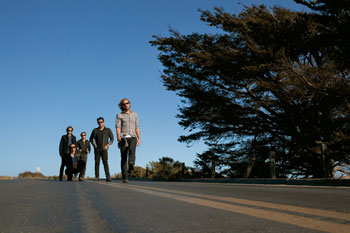
Scott Wood: Ok, Hello Hurricane is your first record after leaving a major label and a return of sorts. You guys got your start on indie Christian labels, and now you have left the major label to start one, yourselves. Since, you guys are career rock stars, so I was hoping you could talk a little bit about that huge change.
Tim Foreman: Yeah! What happened is we left Sony/Columbia back, I guess it would be in 2007, and we built our own studio in San Diego where we live. And it was a real exciting time, you know? It felt like we had all this freedom. And it was also probably one of the scarier things that we’ve done. You know, it was a big risk. There’s kind of no net to catch you. I think the real positive about that was that we had no time constraints. Having our own studio and no major label breathing down our necks, we felt like we had full freedom to explore, try things and fail, which I think is important to getting somewhere new. You have to be able to fail a couple of times, you know? And take risks. And so that was all really positive.
It was also challenging in that when there is no rules, there’s no boundaries, that that can become pretty nebulous. We tracked over 80 songs and three or four versions of those 80 songs. So you’re talking about 2-or-3-hundred takes to kind of sift through to figure out what the heck we’re trying to do, what kind of record we’re trying to make. It became as moment of where’s the forest form the trees in that, but we ended up finding our way. Through the process I think we’ve made the best record we’ve ever made. And also the hardest record we’ve ever made.
Scott Wood: Can you take a track off the record and talk about the “risks” in that song?
Tim Foreman: It’s fun for us to go back and listen to songs, some of the takes that didn’t make the record. Every song has radically different takes of exploration. A song like “Sing It Out” is a good example. That started as kind of a full band song—we’ve got multiple versions like that we finished. We ended up stripping it back to a completely acepella song, except for some kind of background sounds until the very last chorus. That’s an example of kind of the risks that we were taking, things we hadn’t done before, things that would really feature the song and not clutter it. When I think of this record, I think of an infinite horizon as opposed to a downtown cityscape.
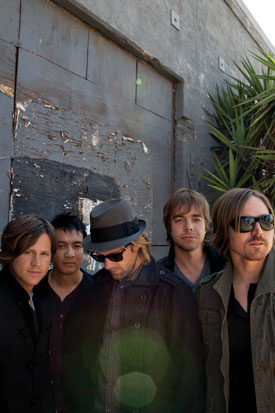
Our last record, Gravity, might have more of a downtown city record, where there’s a lot of traffic, a lot of excitement—a lot going on. And this one is a lot less cluttered. Two different approaches. I don’t think either one is better than the other, but this is definitely what we were going for on this record.
Scott Wood: You worked with Mike Elizondo on this record. He is typically a hip hop guy, trying to move a little more mainstream. I also read you “auditioned” two producers. When you are at this stage in the game, can you talk about what a “producer audition” is?
Tim Foreman: Mike Elizondo was great to work with. Kind of how we arrived at him was like you said, we went through a few other producers on the way there. You know, we don’t’ really audition producers, per se, it’s more like there’s a few people we’ve worked with or we’ve known about, over the years, and so it’s a matter of calling them up and saying, “Hey. Let’s track some songs together.” There’s no real demo phase anymore. There’s no audition phase anymore. You’re always rolling tape. There’s no reason a demo couldn’t sound good enough to be on a record, you know?—especially with our own studio. So, the goal is always, “Well no. We’re always tracking for the album.” Knowing in the back of our minds that if it sucks, we can scrap it. The two people that come to mind that we’ve worked with, before we worked with Mike, were Charlie Peacock, who we’ve actually done a few projects with, and a few other individuals that to their credit... It wasn’t anything about their approach that we didn’t end up working with them; it was more the songs we were working with at the time. But Mike Elizondo was really instrumental in coming in at a time when we were kind of getting lost in the madness of how many songs we had written.
 The questions we all have: "For us, music is kind of a vehicle to explore things we don't understand-that's why we have a lot of questions in our songs...In a song, anything is fair game.
The questions we all have: "For us, music is kind of a vehicle to explore things we don't understand-that's why we have a lot of questions in our songs...In a song, anything is fair game.
Scott Wood: What was it like getting a hip hop guy to work with a modern rock group?
Tim Foreman: Well, you know, the big records that he has done, for the most part, have been hip hop, but he’s actually a real rock guy. And he’s done some real artistic stuff too—Fiona Apple and people like that. And so he’s really musical across the board. His amp, guitar and bass collection is better than anyone’s I’ve ever seen. Just a lot of really great old gear. We like old stuff form like the 60s and 70s—it was kind of like a guitar museum.
He’s definitely a rock guy and what I think he did was he reminded us of who we were. In the midst of the all the exploration, he was kind of an island of “What are the songs that only Switchfoot can sing?” We rallied back around that, taking what we had learned with us.
Scott Wood: Can you give a specific example?
Tim Foreman: I think we were afraid of making big rock tunes, simply because we have made a career on that and we felt like to do something new—which we certainly wanted to do on this record—it must not be “big rock.” And I think we were able to find a way that we could still have those big aggressive songs, but also do it in a way that we hadn’t done it before. I think “Mess of Me” is a good example of that.
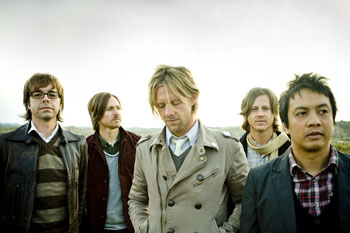
Scott Wood: What happened to all those leftover songs? You have four albums worth!
Tim Foreman: Yeah! There’s definitely one cohesive album that is kind of in-the-waiting, called Vice Verses. We’re excited about that. There’s probably two more albums in there, not as cohesive as Vice Verses, but I’m sure they’ll all find their way out in some way or another.
Scott Wood: Wow. You have one record in reserve?
Tim Foreman: Yeah, we were initially thinking 2010, but we pushed Hello Hurricane back a bit, so now it’s probably 2011 at this point.
Drums start blaring and the soundcheck for the opening band begins. We both wince. Since this will make the doing interview problematic.
Scott Wood: I hope I can use this. You guys started in Christian rock and you are one of the few that have been able to crossover to mainstream rock, whatever that is. So, I was hoping you could give me your thoughts on Christianity in your life and in your music.
 Reaching past one genre to another: "The idea that everyone is going to get a different meaning out of the song - I love that - I think that has always been a part of music and rock and roll. I love it when someone comes up to me after the show and tells me what the song means, because I think that their answer is just as valid as mine.
Reaching past one genre to another: "The idea that everyone is going to get a different meaning out of the song - I love that - I think that has always been a part of music and rock and roll. I love it when someone comes up to me after the show and tells me what the song means, because I think that their answer is just as valid as mine. 
Tim Foreman: Our faith has always been a part of how we make our music. The only way I know how to make music is writing honest songs about honest things that I’m dealing with and so because of that our faith comes out in the songs—probably in every song. For us, music is kind of a vehicle to explore things we don’t’ understand—that’s why we have a lot of questions in our songs. You can talk about something in a song that might be really uncomfortable to talk about in a conversation with even a close friend. In a song, anything is fair game and that’s the type of music that we have always admired whether it be Dylan or U2 or Johnny Cash—people where there is a spirituality, a real belief behind what they are singing. Whether you agree with them or not, you believe it because it is coming from a place of honesty not a place of... Not something that is fabricated.
Scott Wood: In your mind, what is the difference between acts that stay in the genre and those that have a wider appeal?
Tim Foreman: You know, genres are such a weird thing. I mean they’re invented for the purpose of selling records. So we can know where to put ‘em on the shelf. And that’s makes sense—but it kind of take the teeth and the claw out of the art, you know?—so I am not good at that. But I think there is good music that is labelled under the genre of Christian—that is stuck in that category—and it makes sense. We’ve never put that label on our music because we have a different approach. I think it’s not heavy handed, it’s much more a soul-searching experience, you know? There are kind of our fears, our hopes, our dreams, our questions, our doubts—all of those things, thrown into a song.
Scott Wood: A SPIN article on your guys said it best. It said you guys do a great job of saying one thing to one part of your crowd while saying another thing to the rest of your fans. What do you think about this assessment?
Tim Foreman: I kind of hate it in the sense that someone would think there is an intentional behind saying something that has a dual meaning to two different people, because, for me, these songs are written about a specific thing. The idea that everyone is going to get a different meaning out of the song—I love that—I think that has always been a part of music and rock and roll. I love it when someone comes up to me after the show and tells me what the song means, because I think that their answer is just as valid as mine. But I do hate the idea that someone would write a song with the sneaky intention of an ulterior motive or sneaking in a dual meaning or something, because I don’t know how to write like that. There’s kind of only one way to write for us and that’s just, “Here we are!” wearing our hearts on our sleeve.
The Interview Show is everywhere.
Follow me on twitter @interview_show
Listen to The Interview Show on SoundCloud soundcloud.com/interviewshow
SoundCloud RSS Feed
www.cjsf.ca (Vancouver, BC, Mondays 4:30-5pm PST and Wednesdays 12:30am PST)
www.ckdu.ca (Halifax, NS, Saturdays 1:30-2:00am AST)
www.radiocfxu.ca (Campus Community Radio, Antigonish, NS, Fridays 11pm-12am AST)
www.cfru.ca (University of Guelph Radio, ON, Tuesdays 3pm EST)
www.umfm.com (Winnipeg’s Hit Free Radio, Fridays 6-6:30pm CST)
www.caperradio.com (Cape Breton University Radio, NS, Wednesdays 3-3:30pm AST)
www.localfm.ca (Campus Radio Saint John Inc., NB, Tuesdays 11:30am and Fridays 3:30pm AST)



